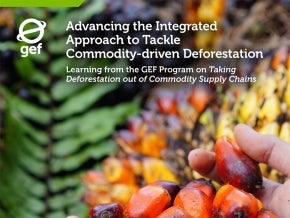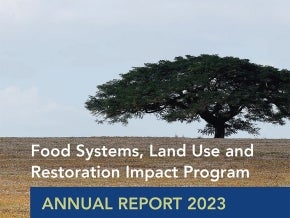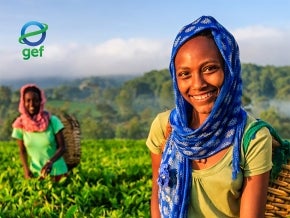
The World Day to Combat Desertification (WDCD), observed every year on June 17th, promotes public awareness of international efforts to combat land degradation. WDCD 2019 theme, “Let’s Grow the Future Together,” calls for the achievement of Land Degradation Neutrality through the involvement and cooperation of all levels of the global community.
This year, on the 25th anniversary of the United Nations Convention to Combat Desertification (UNCCD), the Convention celebrates progress in sustainable land management, while also looking towards the advancement of its goals in the years ahead.
“June 17th and 25th anniversary is a time for us to look back at what we have done so far, but also into the future,” said Ibrahim Thiaw, Executive Secretary to the UNCCD, during his interview at the landmark 56th GEF Council meeting this week in Washington, DC. “With 75% of the Earth's land being degraded, land degradation is a trauma. But there are solutions, and land restoration is an opportunity - it’s about food, jobs, livelihoods, ecosystems, biodiversity. It is as much about the environment, as it is about people. It is a powerful tool.”
Signing a new partnership agreement with Thiaw on the margins of the council meeting, Naoko Ishii, GEF CEO and Chairperson, congratulated the UNCCD on its anniversary and highlighted the excellent cooperation between the two secretariats. She said support for land issues was a high priority in GEF-7, the GEF’s current four-year funding cycle.
The Global Environment Facility (GEF) is a financial mechanism of the UNCCD. Since 2006, the GEF has invested more than $1.069 billion in projects and programs encouraging sustainable land management practices, and recognizing Land Degradation Neutrality as a key target for sustainable land management.
Approved at the GEF Council meeting, the largest-ever work program in the history of the GEF includes four impact programs that aim to bring countries together in an integrated approach to the conservation, management and restoration of vital ecosystems.
Heralding the “historic” GEF work program Naoko Ishii said it signified “a new way of doing business,” and, she added, “a new phase for GEF’s strategy and implementation.”
One of these four impact programs is the Dryland Sustainable Landscapes (DSL) Program, which will focus on three dryland regions: the Miombo and Mopane ecosystems of southern Africa, the savannas of West Africa and the temperate grasslands, savannas, and shrublands of Central Asia. Through the management of the landscapes in these regions, the program aims to reduce and reverse further degradation, desertification, and deforestation, while also establishing the basis for sustainable dryland management on a global scale. The DSL program, led by FAO and in cooperation with four other GEF agencies, will avoid the deforestation of 250,000 hectares of high conservation value forests while bringing 12 million hectares under sustainable management. Furthermore, the program will improve the management effectiveness of 1.65 million hectares of protected areas and restore 1.2 million hectares of degraded drylands, resulting in total GHG emission reductions of 98 million tCO2.
At a time that 2 billion hectares--roughly a quarter of the Earth’s land surfaces--has already been degraded, both the demand for and the risks to that land are higher than ever. Our planet’s drylands are of particular importance. Supporting two billion people and producing 60 percent of the world’s food, drylands cover 40 percent of the planet’s land mass.
Human activities and climatic variations continue to degrade drylands; about 12 million hectares of dryland are suffering desertification every year. It is therefore important to implement the UNCCD’s concept of Land Degradation Neutrality (LDN) to stop and reverse land degradation. GEF is supporting developing countries in delivering their LDN targets. In Ecuador, for example, the “LDN Target-Setting and Restoration of Degraded Landscapes in Western Andes and Coastal areas” project financed by the GEF and implemented by FAO, will promote sustainable land and forest management for the recovery and restoration of prioritized landscapes that sustain environmental services and food security in the region. The project will also establish support mechanisms for achieving and monitoring LDN targets.
The investments will focus on 3 different areas including forests, croplands, grasslands and pasture, covering in total around 0.7 million hectares and hosting ecosystems of global importance, which are particularly threatened by deforestation and land degradation. The project will deliver Global Environmental Benefits, by restoring 4,000 hectares of forested lands, putting 33,000 hectares of landscapes under improved practices and mitigating over 12 million tCO2e. Around 6,000 women and men are expected to benefit from the project through improved access to incentives and services.
Click here to access the GEF Land Degradation Focal Area Strategy.


